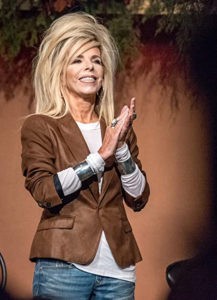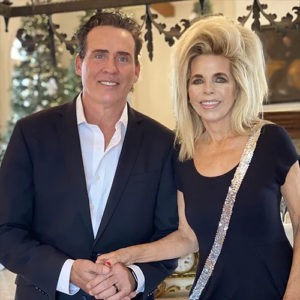It was an overcast morning near Smyrna, Tenn., as a small Cessna private jet abruptly descended toward the earth. Seven people on board, who had been looking forward to a trip to Palm Beach, Fla., were now taking their final breaths. And as the plane crashed into Percy Priest Lake on the morning of May 29, 2021, the author and pastor Gwen Shamblin Lara along with her husband, Joe Lara, son-in-law, Brandon Hannah, and four other church leaders were tragically killed.

Gwen Shamblin Lara
Gwen Shamblin Lara had been a weight control consultant through the 1980s and came to international prominence after developing the “Weigh Down Workshop” program that began in a Baptist church and grew to 21,000 classes and more than 250,000 participants by 1998. Her book, The Weigh Down Diet, sold more than 1.2 million copies. Then in 1999, she planted the Remnant Fellowship Church in Brentwood, Tenn.
Lara became the subject of a documentary series on HBO Max titled The Way Down: God, Greed, and the Cult of Gwen Shamblin, which was released with three episodes in September 2021. As the series develops, it becomes clear that the producers believe Remnant Fellowship Church, where Lara served as the founding pastor until her death, is a cult.
Of course, the church put out a statement saying Remnant Fellowship “categorically denies the absurd, defamatory statements and accusations made in this documentary — yet another Hollywood attack on religion.”
Remnant Fellowship “categorically denies the absurd, defamatory statements and accusations made in this documentary — yet another Hollywood attack on religion.”
They also have a statement on their website by J. Gordon Melton, a professor of American religious history at Baylor University, saying that based on his visits to the congregation, “the church presents itself, apart from its few unique beliefs, as just another suburban Protestant congregation, not unlike the Baptist, Adventist, Methodist and Presbyterian churches with whom they share space in the city … Yet in spite of the averageness of its members, the Remnant has been accused of being a ‘cult.’”
Melton goes on to say that the word “cult” is a word that “has lost any value in the study of religious groups,” that it “has devolved into a mere label to denounce groups,” and that Remnant Fellowship does not seem to have “‘cultlike’ tendencies.”
Damning witnesses
Yet, The Way Down puts forth a damning set of witnesses and former church members who claim to have been abused by Remnant Fellowship. One former recruit named Adam Brooks said, “It’s not ’til you get a good way in that you see some of the other stuff that’s behind the curtain.”
While one person points out the common sighting of churches on every corner in the South, they explain, “You would never guess that this church was so different from all the others.”
But is it so different from the others? Since the documentary sets up a comparison, how does Remnant Fellowship stack up to other ministries?
“Gwen Shamblin’s motivation isn’t money. It would almost be easier if it was. But I think her motivation is power.”
Many of the conversations around cult-like ministries over the past few years have been about “health and wealth” preachers who use the promise of future financial blessing to bribe their followers into giving money.
But while Lara certainly had her share of wealth, her overall message as seen in The Way Down documentary series did not seem to reflect the overt health and wealth pleas for cash that have become so easy to recognize. Glen Wingerd, a former Brentwood resident, said: “Gwen Shamblin’s motivation isn’t money. It would almost be easier if it was. But I think her motivation is power.”
And with that observation, one must wonder how her ministry might compare with the many mainstream conservative evangelical complementarian churches that also obsess over power.
God wields power over all
It makes sense that Lara would be accused of being obsessed with power, given that her fundamental way of viewing God was through the lens of power. She said that God is “jealous of us worshiping objects more than him,” told a group of children that “it’s all about God,” and declared, “I am right now on fire for God to get his way. That’s what I want! God to get his way!”
To many Christians, hearing that “it’s all about God” may sound good. But when it’s framed within a construct of God “getting his way,” this subtly reveals a hierarchical picture of a God with flexed muscles rather than a God within and among us with outstretched arms.
Lara reveals the hierarchical nature of her theology while describing her weight loss program, saying, “What I do in this program is teach people how to stop bowing down to the refrigerator and how to bow back down to him.” She also was careful to frame it within the context of love, saying that it was about falling out of love with food and in love with God.
“Lara reveals the hierarchical nature of her theology while describing her weight loss program.”
She told Larry King in 1998: “We were made to be addictive. And I’m not asking people not to be addictive. I’m saying transfer over this addiction to God.”
How is this transfer of addiction any different than John Piper’s “Christian hedonism,” which he describes in Desiring God as a belief that “the longing to be happy is a universal human experience … we should never try to deny or resist our longing to be happy … instead, we should seek to intensify this longing and nourish it … the deepest and most enduring happiness is found only in God?”
What eventually got Lara in trouble with evangelicals was when her hierarchical view of God led her to deny the Trinity. Her reasoning was that “God is above all.”
Ironically, many leading complementarians also have been accused of denying the Trinity due to their hierarchical view of God. In The Grand Design, Owen Strachan says, “The Father is the authority of Christ, and always has been.” Wayne Grudem said, “I hold to the eternal submission of the Son to the Father.”
In The Story of Christian Theology, church historian Roger Olson explains that in the fourth century, Arius began to teach that we were to follow “Christ’s example of submission to God.” He explains that orthodox Christian theology links “the Son’s essential identity with the Father,” while Arianism links “the Son’s identity with the creatures” and connects Jesus to the Father through “conformity of will.” The result of Arius framing Jesus as being in subordination to the Father was that more than 300 bishops condemned his teaching as heresy.
So while Gwen Shamblin Lara used hierarchy to say that the Trinity can’t sufficiently explain the person of God, these leaders of conservative complementarianism go even further to break up the Trinity into a heretical hierarchical power structure.
The pastor wields power over the church
The role of the pastor at Remnant Fellowship has to be seen in light of their power dynamic with God and the Bible. As the series points out, they believe that “the Bible is literally true,” and that “all the answers are in the Bible.”
While it is understandable that evangelicals would want to promote the authority of the Bible, it is important for them to recognize the power dynamic that happens when they believe the Bible has all the answers and the pastor is the one who teaches the Bible.
One former member said, “The overarching theme of everything that she ever taught in there was always being under God’s authority, which was her.”
“The overarching theme of everything that she ever taught in there was always being under God’s authority, which was her.”
But how are pastors seen in other conservative evangelical churches?
When John MacArthur famously told Beth Moore to “go home,” those two words became what everyone focused on. But later in the clip, MacArthur said of Southern Baptist women who preach: “They want power, not equality … This is the highest location they can ascend to that power in the evangelical church.”
How have people not zeroed in on what MacArthur revealed about his views of the pastorate? He explicitly said that the position he holds is the highest location of power one ascends to. How is MacArthur’s power ascension language any better than what Gwen Shamblin Lara believed about her position?
Men wield power over women
One of the obvious differences between Remnant Fellowship and mainstream conservative evangelicals, however, is that Gwen Shamblin Lara was a woman who was allowed to preach and have authority.

Joe Lara and Gwen Shamblin Lara
A longtime member named Rachel Phillips observed, “Leadership is men, which I always found interesting that a woman’s the leader, but then she puts men over everyone else.”
“There are certain men who are elders of the entire church … and then Gwen was under their authority,” a former Remnant recruit named Adam Brooks explained. “But the truth of the matter is the idea that I don’t think Gwen is accountable to anybody. So if you take Gwen out of her slot and put her on top and put her over the elders of the church, that’s your leadership structure.”
In the home, Lara taught that, “If you’re married, the husband’s over the woman.”
Phillips recounted, “When Gwen said the man is the head of the household, if your husband says this then you do that, you didn’t question it because if you questioned it then you were taken into leadership counseling.”
One of the most disturbing examples of marital abuse recounted in the series was when one woman was counseled to have sex with her husband without her consent, which is marital rape.
How does Lara’s view on “obligation sex” compare to other mainstream evangelicals?
How does Lara’s view on “obligation sex” compare to other mainstream evangelicals? John Piper’s friend Doug Wilson said: “The sexual act cannot be made into an egalitarian pleasuring party. A man penetrates, conquers, colonizes, plants. A woman receives, surrenders, accepts.” In Every Heart Restored, Fred and Brenda Stoeker said it becomes problematic if a husband has to coerce his wife into sex “more than once a day.” It’s a commonly known practice that a wife who does not give her husband sex can be subject to church discipline.
But while the marital abuse that is recounted at Remnant Fellowship is very real and deeply wounding, doesn’t the fact that a woman was allowed by their male leaders to preach and have authority signal that mainstream complementarianism is even more extreme than Remnant Fellowship?
Parents wield power over their children
Perhaps the most difficult part of the series to watch has to do with the abuse of children. When a babysitter asked a parent how to help their child calm down, the parent said, “Hit him hard.”
One parent remembered, “We had a leg spanking over and over and over and over and over and over again.”
Remnant Fellowship taught their parents to hit their children with spatulas, wooden spoons, glue sticks, belts and hands.
Remnant Fellowship taught their parents to hit their children with spatulas, wooden spoons, glue sticks, belts and hands.
But their ultimate power over the children was the threat of hell. Lara was recorded telling children that if they disobey, “You will only live for a few years on earth and then you will have a horrible afterlife.”
Then in one case, a child was put into a wicker box that was slammed shut by his parents, and he died.
Of course, the church denies teaching anything that led to the death of the child. But how can we be shocked when a culture that controls kids through physical violence ends in death?
How does this approach compare to what mainstream conservative evangelicals teach? John Piper says he is so convinced that it is biblical to “whop a child on his behind or his chunky thigh” that he would be willing to go to jail for it.
Everyone wields power over their image
One of the saddest realities that fills evangelical auditoriums is the presence of open wounds suppressed for the image of happiness.
Some of the former members recounted, “It’s all about reputations and appearances,” … “The people are always happy, or they look happy,” … and “There is a bit of this fake persona … that you know is just for show.”
The weight of power being wielded by their structure of a hierarchical God, pastor, men and parents becomes unbearably heavy for those toward the bottom of the tower and for those who have to hide their grief.
One former member lamented, “It’s wrecking families. It’s wrecking kids. It’s giving them eating disorders. It’s ruining marriages. It’s giving people PTSD, social anxiety, depression, suicidal thoughts, self-harm.”
Church members were not allowed to be seen seeking therapy or taking medicine for their struggles because the Bible supposedly has all the answers and the elders allegedly have all the authority.
But with all that weight bearing its way down the hierarchy, they happily raise hands and dance while singing, “Glory to God in the highest!”
While HBO Max claims that Remnant Fellowship functions like a cult, Remnant Fellowship claims that they are just like most mainstream conservative evangelical churches. Could it be that both of them are right?

Rick Pidcock
Rick Pidcock is a freelance writer based in South Carolina. He is a former Clemons Fellow with BNG and recently completed a master of arts degree in worship from Northern Seminary. He is a stay-at-home father of five children and produces music under the artist name Provoke Wonder. Follow his blog at www.rickpidcock.com
Related articles:
Du Mez sees link between sexual abuse cover up and complementarian theology
I knew the truth about women in the Bible, and I stayed silent | Opinion by Beth Allison Barr


